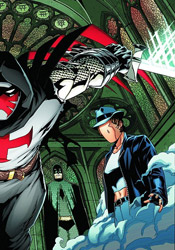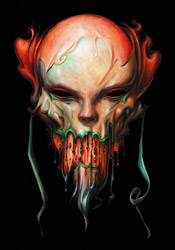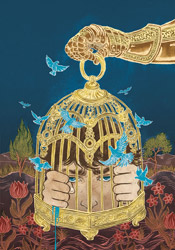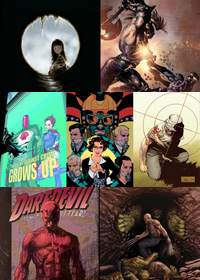A quick glimpse at what else I've been reading this month...
Ojo - As a longtime Sam Kieth admirer, this is really tough for me to say but
Ojo reeks. While this isn't the first time he's dealt with a very young protagonist, going through emotions more complicated than they deserve, it's the only time he's lost my attention along the way. Nearly all of Kieth's earlier creator-owned work is densely layered with a twinge of sadly genuine introspection, but by comparison this just feels like a shallow retread of ground he's already covered. Annie really isn't that fascinating of a lead character, and the only other faces in the story - her bullish sister and spaced out grandfather - are one-dimensional and don't bring anything extra to the story. Usually I can fall back on Sam's artwork and shut off my brain in that kind of a situation, but even that escape is lacking, since he only provides about half of the illustrations. The remainder are contributed by a small squad of imposters and fill-ins who don't even come close to meeting expectations. I've always loved Kieth's character-driven stories, but it's time for something different already, and
Ojo seems all too familiar.
2/10Dark Avengers #9 - There's very little going on this month, but after the total information overload of the last three issues that's a welcome change. Bendis spends most of this edition examining and progressing the motivations of Ares, his son Phobos and Nick Fury's band of merry men. I don't care all that much for Fury's generic Secret Warriors or their motives, but the extra focus on Ares is nice, especially since he's using his big boy voice and keeping the axe swings to a minimum. Mike Deodato's artwork is solid if not spectacular, and the sudden change in Sentry's life at the end of the story is, er, interesting. Really this is a ho-hum issue that less dedicated readers could get away with skipping, but the characterization is good to see and god only knows I'm glad the X-Men have finally gone home.
5/10Batman & Robin #4 - The first issue sans-Quitely didn't do much to quell my fears about the series in his absence. Phil Tan was wise to get a fresh start without attempting to mimic his predecessor's style, and for the first few pages I was willing to believe he could actually get the job done. But as the issue bore on and the pace slowed down, he seemed to lose interest and my enthusiasm went right along with him. I'm mildly interested in the identity of the Red Hood, and I like the contrast of his message and methods against those of Dick and Damien, but this is quickly becoming just another mainstream DC book and not the continuous blast of fresh air it had been during the first three issues. Grant Morrison can write some fantastic material at times, but he can also get terribly self-absorbed. At around the two-thirds point I realized that I was just pressing toward the last page out of personal obligation and not because I was really all that interested in seeing where this story is going. That's a major change from last month.
6/10Ex Machina #45 - Kind of loopy at some points, completely overboard at others, with a parting shot that's pretty much ensured I'll hang around for the rest of the series. The timing of
Ex Machina has always been a bit suspect in my eyes, since author Brian K. Vaughan likes to jump from the middle of a finance meeting to the heat of an awkward super-powered fight without so much as a lead-in, but that's grown to be part of this book's charm over the years. To tell the truth, I'm actually enjoying the twists and turns of Mitchell's political career much more than I am the central plot point of the origin and intentions of his incredible powers. We get equal doses of both this month, and it's good but not great.
7/10The Walking Dead #65 - I still haven't read an issue of
Walking Dead I dislike. The current storyline is moving at an agonizingly slow pace, but that's only allowed me more time to savor and appreciate it from month to month. After playing the hunted for much of their time together, whether from the zombies or wandering groups of ill-intentioned survivors, Rick and company finally reach their breaking point this month and fight back. I was ready to jump off my couch and cheer when they caught the hunters unprepared and played their hand. Great pacing, fantastic characterization, unlimited potential for disaster and a sinister willingness to convince the readers that no single character is ever really safe. Most titles are lucky to count just one or two of those attributes in their stat sheet, but Kirman and Adlard's horror-tinged monthly digest enjoys a clean sweep.
9/10Giant Size Wolverine: Old Man Logan - The finale you had to expect within the arc's first six pages. It's unabashedly violent, occasionally over the top and often shamefully self-indulgent, but it's also cool to finally get a straightforward payoff, rather than an open-ended invitation for the follow-up or a vague swerve at the last minute.
Old Man Logan was always going to be a revenge story, a quest to put off Logan's berserker rage as long as possible before setting it off in a sudden gooey fireball of wetworks. Well, that wait's over and now it's time to pay the piper. It's not Millar's smartest work, nor his most respectful, but it's still an entertaining read if you don't mind getting your hands dirty and browsing thirty pages' worth of disemboweled bad guys and stacks severed green limbs. The non-stop mayhem is a great opportunity for Steve McNiven to really cut loose and impress with his visuals, which he does without hesitation. This wouldn't work all that well if the artwork weren't so gorgeous, but it's still a far cry from perfection. Millar's experiment was fun, but I'm glad it's over.
7/10MK Daredevil, Volume 4: Underboss - I'm catching up on the few issues of
DD I missed over the years, and this was a pretty important arc to have skipped out on. In their first baby steps with the series, Bendis and Maleev wasted no time in making a big impact; in the first issue alone they've upset the balance of power within the Kingpin's inner circle, introduced a new challenger to that throne, set a bounty on Matt's head and bombed the scene of his latest trial. Although I really grew to love Ed Brubaker's take on
Daredevil, I'd forgotten how gripping and simplistic Bendis's plots really were. His writing is easily approachable, direct and moving. It's a breeze to read but also much deeper than it appears. The real focus of this arc, aspiring crime boss Mr. Silke, is charismatic, scheming and motivated. His dialog comes straight from the streets, but his aspirations are much loftier. That Silke's fate plays out without so much as a face-to-face with the red-garbed guardian of Hell's Kitchen speaks to both the immense depth of this book's supporting cast and Bendis's sharp, immediate understanding of it. At this point he was managing a fantastic balance of superheroics and dark, seedy noir, and while later arcs would dabble a bit more deeply in one direction or the other, right here they're working in perfect harmony. Maleev's artwork is also something I didn't realize I'd missed so sorely. His compositions throughout this arc are gorgeous, especially when he's playing with the masking effects of deep shadow and sharp contrast. Daredevil has never looked so sinister and menacing as he does in Maleev's hands, stalking through the shadows and striking fear into the hearts of villains (and readers) across the city. The ultimate repercussions of this arc are still playing out in the ongoing series, five years and ninety issues later. If that isn't the mark of an impressive debut, I don't know what is. It's great material that really set the mood and the direction of a series on the verge of a genuine renaissance. Fantastic on its own, in retrospect it's become even more impressive.
9/10




